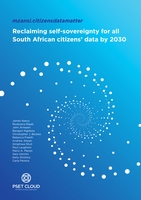
South Africa is a country of many contradictions. With a Gini coefficient estimated at between 0.63 and 0.7 in 2021, the country is the most unequal in the world (International Monetary Fund [IMF] 2020). Many of its citizens are unemployed: Statistics South Africa (2021) found that the official unemployment rate was 32,6% in Quarter 1 of 2021, 34,9% in Quarter 3 of 2021 (Quarterly Labour Force Survey [QLFS]) further exacerbated by the Covid-19 pandemic. Young people (15-34 years) are disproportionately represented in these numbers, with 43,6% not in employment, education or training [NEET] (Ibid). In this same country, sophisticated financial systems are internationally respected, with new technological innovations being developed and utilised through cryptocurrencies, increasingly new forms of credentialing (Rajab et al, 2019; Dale-Jones & Keevy, 2021), and linked to these developments, also new forms of digital governance (Manda 2017; West & Beukes, 2021). This juxtaposition, combined with the impetus of post-pandemic recovery initiatives, poses a unique opportunity for a reset of the education and training system to be more open, fairer, and critically, founded on the principles of self-sovereignty (Tapscott, 2021).
This paper contains a set of case studies contributed by a diverse range of authors as part of a crowd-authored initiative that took place between December 2021 and January 2022. The call for contributions was limited to experts and partner organisations that have been directly or indirectly involved in a national digital platform initiative, called the Post-School Education and Training Collaboration for Learning Opportunities for the Utilisation of Data (PSET CLOUD). The PSET CLOUD is a platform that aims to enable users such as learners, government, industry, NGOs and education institutions to share and use data for decision-making that promotes a more efficient and responsive post-school education system. The PSET CLOUD was initiated by the Manufacturing, Engineering and Related Services Sector Education and Training Authority (merSETA) and JET Education Services. The platform development is taking place as a national initiative under the oversight of the Department of Higher Education and Training (DHET), and with close proximity to the South African Qualifications Authority (SAQA), Umalusi, the Quality Council for Trades and Occupations (QCTO), and the Council on Higher Education (CHE). The platform development had been underway for four years at the time that this paper was prepared, and has involved key partners and subcontractors, such as the Council for Scientific and Industrial Research (CSIR), Reos Partners, COOi Studios, Kaitoma Creatives, and JumpCO. A detailed theory of change underpins the PSET CLOUD and has undergone several iterations. The overall impact statement reads as follows: ‘South African citizens make informed labour market decisions that lead to increased employment in line with NDP targets’.
This paper consists of eight vignettes, followed by a concluding section. Each vignette has been contributed independently and they do not necessarily link to each other in a logical sequence. Four key questions do however run across the contributions:
How can the South African education and training system be reset in a way that allows it to leapfrog many of its contemporaries?
How can the key ideals of open, fair, and self-sovereignty be realised?
What developments are already in place that can be strengthened and combined?
What new governance models exist, and how can they be realised in the South African context?
As authors we invite robust engagements with our contributions and trust that this paper will provide an important anchor point for discussions addressing unemployment in South Africa through the development of digital platforms. We strongly advocate that these discussions are underpinned by an awareness of and respect for individual data privacy rights, enhanced interoperability across data systems, and new thinking on the recognition of learning through digital credentialing.